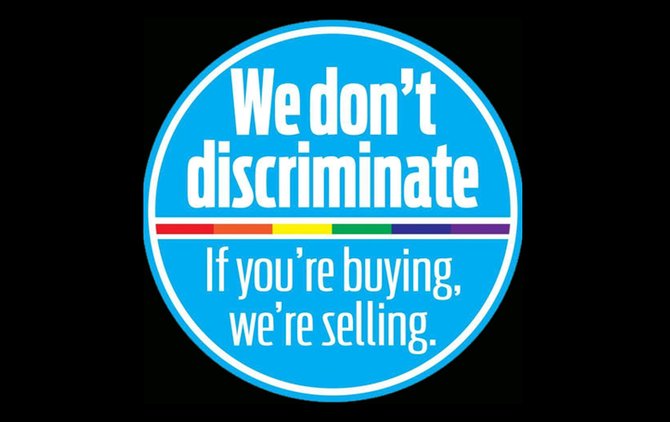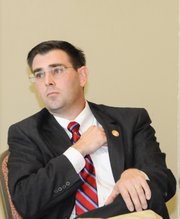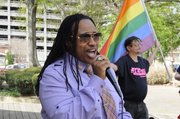Six weeks ago, Joce Pritchett was relaxing on her couch and watching TV at her home in Jackson when she received a copy of Senate Bill 2681. The bill, the Religious Freedom Restoration Act, first sparked controversy among civil-liberties groups in February because of its potential to allow business owners to refuse service to people, especially the LGBTQ community, whom they feel are infringing upon their religious freedom.
As both a businesswoman and lesbian, Pritchett did not like the idea of that one bit, so she decided to get off the couch and do something about it. Pritchett, owner of Pritchett Engineering and Planning LLC., knew she needed to find someone who would be willing to come forward and lead the rally against the bill. After a few days of searching, she found the perfect person.
"About three days later in the middle of the night, I had this epiphany that I was the leader I was looking for," Pritchett said.
She immediately volunteered as the regional vice-chairperson of Equality Mississippi, an organization devoted to promoting social justice and advancing equality for LGBTQ Mississippians, but recently resigned fom the post.
Pritchett says that although they weren't in the closet before the bill's passing, she and her wife, Carla, whom she married in Maine, flew under the radar, spending much of their time working and taking care of their two kids. She admits to having no previous experience in activism but says the bill's passing came as a big wake-up call, and not just to her.
Before 2681, many local gay professionals did not involve themselves with much LGBTQ activism, choosing to focus more on their careers and private lives, Pritchett says. However, more and more gay professionals are coming forward to oppose the bill, which helps explain the recent explosion of advocacy in the Jackson area. She joked that the 10-person committee she originally sought to organize has almost turned into what she calls "an army."
"We just kind of left activism to the activists, but something about that Senate bill woke a lot of us up. ... We've just been doing our own thing, but it's like we all woke up at the same time," Pritchett said.
Although Republican Gov. Phil Bryant signed the bill, surrounded by national religious-right leaders including Family Research Council President Tony Perkins, and it will become law July 1, 2014, the motivation for resistance in Mississippi has strengthened. The new resolve for LGBTQ rights here spans from the Human Rights Campaign's plan to spent $8.5 million to set up office in Mississippi, to the increasing number of anti-discriminatory resolutions in small Mississippi towns, to local straight business owners here in Jackson joining the fight.
'In God We Trust'
Mississippi's public outcry began with a quiet effort to give businesses the right to refuse service to LGBTQ customers.
An early version of SB 2681, which passed the Senate unanimously in late January, was similar to a bill that Arizona Gov. Jan Brewer recently vetoed in Arizona. Under pressure, she rejected it after deciding that it would hurt the state's economy by driving big business out of the state. It is among many "turn away the gays" bills floated around the country in states including Kansas and North Dakota. The legislation's language traces back to efforts by ultra-conservative groups such as Focus on the Family and the Rutherford Institute to push innocuous-sounding "religious freedom" laws that courts have said provide cover for discriminatory actions.
Mississippi progressives initially did not see anything amiss when Republican sponsors presented SB 2681, emphasizing the part of the bill that would modify the state seal to include "In God We Trust."
"We learned in the vetting of this bill that (the state seal) is clearly not the sole purpose of the bill," said Brandon Jones in an interview. Jones, a former legislator from the Gulf Coast, is the executive director of Mississippi Democratic Trust, which supports Democratic candidates and lawmakers.
"No one mentioned anything about discriminatory practices. There were no questions, (and) it passed overwhelmingly," he said. "It also tells me that the folks who knew what was in this bill must not have felt too proud about it because, when they were presenting, they didn't fully explain it."
Once the bill's connection to the "turn back the gays" movement emerged, Sen. Derrick Simmons, a black Democrat from Greenville, took a strong stance against it, comparing the bill to Jim Crow legislation that enabled legal discrimination of African Americans until the 1960s. On the floor of the Mississippi Senate on April 1 before the bill's passing, Simmons urged fellow legislators to vote against the bill. "If you have never been discriminated against, you don't know how that feels," he said.
On the other hand, House Judiciary B Committee Chairman Andy Gipson, a Baptist pastor and a Republican from Braxton who caused an uproar in 2012 when he said on Facebook that the Bible said homosexuals "are to be put to death," helped lead the coalition to keep the bill alive as it ran through the Mississippi House. He chaired the House committee that toned down highly controversial language in the original bill. "We need a well-reasoned bill that protects our religious freedom," Gipson said.
The final version was amended to say that state action or a person acting on behalf of state action cannot burden a person's right to exercise their religion. The bill also defines "burden" as "any action that directly or indirectly constrains, inhibits, curtails or denies the exercise of religion by any person or compels any action contrary to a person's exercise of religion. 'Burden' includes, but is not limited to, withholding benefits, assessing criminal, civil or administrative penalties or exclusion from governmental programs or access to governmental facilities."
The bill's opponents worry that it remains a "license to discriminate" bill, especially against LGBTQ citizens, because it will make it even harder to mount a legal challenge than it is now. Federal anti-discrimination laws do not allow the same scrutiny of LGBTQ discrimination that it does racial, ethnic and religious minorities.
"This bill has nothing to do with faith and everything to do with codifying shameful discrimination," said HRC President and Arkansas native Chad Griffin in a February statement. "We have seen businesses, people of faith and political leaders from both sides of the aisle speak out against this type of legislation. Passing this bill would not only place Mississippi firmly on the wrong side of history, it would hurt the state's economy and tarnish its reputation."
Despite the bill's vagueness and uncertainty, or perhaps because of it, the Human Rights Campaign and others who opposed the bill are using the momentum and fears caused by 2681 to amp up the movement for LGBTQ rights in Mississippi.
An Economic-Development Issue
The recent flurry of activism in the city—gay-pride events and protests—means Jackson could become Mississippi's LGBT "sanctuary," a place where the state's gay population can seek refuge, connect, organize and prosper.
Richard Florida, the director of the Martin Prosperity Institute who first studied the economic-development potential of "creative class" cities such as Jackson, wrote in his book "Who's Your City?" that both artistic and gay populations contribute to the creative economy that sustains many cities within the U.S. Florida referenced what he calls the Bohemian-Gay Index, explaining that areas with a higher number of both artists and homosexuals tend to drive up urban housing prices.
Florida noted that although artistic and gay populations are relatively small, a study he helped conduct in 2007 found that presence of those groups, which often intersect, held a substantial correlation with housing values, regardless of what variables or model versions they used.
"Many people believe that gays and lesbians do not cause growth but are merely drawn to certain types of places. ... We found that the presence of these populations had a direct relation to housing values as well as other locational variables (such as income and human capital), making these places more attractive to other populations and demographics. In other words, the presence of these groups was not only related to higher housing and values, but higher incomes as well."
With the help of the Human Rights Campaign, Jackson could be well on its way to "sanctuary" status, reaping economic-development help in the process.
HRC, based out of Washington, D.C., this week announced "Project One America," a comprehensive, multi-year campaign to expand LGBTQ equality in the south through permanent campaigns in Mississippi, Alabama and Arkansas. The initiative will have a three-year budget of $8.5 million and a staff of 20 in the three states.
"Right now, this country is deeply divided into two Americas—one where LGBT equality is nearly a reality and the other where LGBT people lack the most fundamental measures of equal citizenship. Project One America is an unparalleled effort to close that gap, and it opens up a bold, new chapter in the civil rights movement of this generation. In this grand struggle for equality, we can't write off anyone, anywhere," Griffin said in a statement.
The HRC also released findings from a recently completed survey for HRC by Anzalone Liszt Grove. It revealed nearly 65 percent of LGBTQ people in Mississippi report suffering from verbal abuse, and nearly one in five report physical abuse, both due to their LGBTQ identity. A quarter of those surveyed have experienced discrimination in employment or public accommodation.
HRC's efforts in Mississippi are not new, though, and helped lead to passage of a pro-LGBTQ resolution in four towns so far—Starkville, Oxford, Hattiesburg and Magnolia. Rev. Rob Hill, who has been working to connect HRC with other local LGBTQ organizations, says that the new HRC office will most likely be in Jackson. He also says that although the project has been quietly in the works for several months prior to the bill, the recent passage of SB2681 proves just how urgent the situation is for the LGBTQ community in the south.
"That bill is a clear example of why we need Project One America in Mississippi," Hill said in an interview.
'I'm a Little Crazy'
Over the course of several months, the HRC met with the city councils and mayors of Hattiesburg, Starkville and Oxford to urge them to pass anti-discriminatory resolutions to send a message against LGBTQ discrimination.
Hill explained that although these resolutions are non-binding, it is important that these resolutions exist because it will aid in unifying state citizens as a whole.
"Certainly, there's no doubt for me that these resolutions offer an economic advantage since most businesses seeking to locate in Mississippi will look to these communities as these resolutions affirm a commitment to inclusion and diversity," Hill said.
"But I believe the greatest impact is on individuals who hear in these resolutions that the community values and recognizes LGBT citizens. This is a statement of worth that cannot only transform lives but has the potential to save lives in the process."
Magnolia, in Pike County hear McComb, was the most recent town to follow suit on April 22 when the Magnolia Board of Aldermen voted 3-2 to affirm the town's support of the LGBTQ community.
Magnolia Alderman Mercedes Ricks, who is originally from Colombia, is a lesbian and the owner of a local restaurant, La Mariposa. In an interview, Ricks explained that she saw the other resolutions being passed around the state and decided she wanted to do the same for her city. She presented the resolution to the board, and it passed 3-2.
Ricks says that a controversy concerning the rainbow flag in front of her restaurant led her to push for the resolution.
About five years ago, a few customers refused to eat at her restaurant because of their religious beliefs, which inclined her to take the flag down. However, Ricks eventually put the flag back outside, saying it made other gay people more comfortable in her restaurant. She also said that she "couldn't care less" if some people don't like that now.
"Gay people have been in the closet for years, and they're afraid of people," Ricks said. "I want them to feel more comfortable with themselves, and I want people to welcome people for what they are. ... But I break the rules, and I'm a little crazy, and I tell everybody who I am, and people come and say how comfortable they are when they walk in this place. That's what I want Magnolia to do for everyone."
Although a similar resolution has yet to pass in Jackson, many are pushing for not only a resolution but also an ordinance that would enforce it.
During the recent special-election runoff to replace Jackson's late mayor, Chokwe Lumumba, the question of whether the candidates would support an anti-discriminatory resolution came up several times at forums and debates.
Tony Yarber, the previous Ward 6 councilman who ultimately won the special mayoral election, said early on in an interview with the Jackson Free Press during his campaign that he did not think a resolution is the solution to protecting the LGBTQ community and also that he was appalled to even consider an ordinance that says that it only protects a certain group of people.
"I don't have to agree with a lifestyle in order to be a defender or to defend that person who carries that lifestyle out," Yarber said. ...With the right leadership, that leader says we're going to protect everyone. And if we find that you have been discriminated against, we're going to deal with you as severely as we can because it isn't right."
Yarber eventually said near the end of his campaign that he supports human rights for all human beings, leading some to think that his opinion about a possible resolution and ordinance might change. He did not return phone calls to address his position.
Laurie Bertram Roberts, the bisexual president of the Mississippi chapter of the National Organization for Women (and columnist for the Jackson Free Press), said that she did not like the "underlying uncomfortableness" in Yarber's answers to questions about LGBTQ rights and discrimination.
"It wasn't a part of his original platform," said Roberts, who supported Yarber's opponent. "... If it was an issue that was important for him, it would have been a part of his platform head on—not something tacked on during the end of the election."
Son of the late mayor and runoff candidate Chokwe Antar Lumumba said several times that he not only wants to build on his father's human-rights efforts but he would also support an LGBTQ resolution and an ordinance that would enforce it.
"I would support it (an ordinance) because I believe in human rights for human beings," Lumumba said, when asked if he would support an anti-discrimination ordinance during a conversation with the candidates at Tougaloo College on April 14.
Lumumba, who is an attorney, also expressed interest in developing a Human Rights Commission with Kali Williams, a social activist who worked with the late mayor to identify external funding for human-rights projects and who helped organize this weekend's "Jackson Rising" conference.
In an interview before the runoff, Lumumba explained that he wanted to develop the Human Rights Commission and invite those interested in expanding human rights.
"In terms of where it is now, we're trying to develop a framework of what we want that commission to look like, and we want to implement that in the city," Lumumba said during the campaign. "We also want to identify people who are committed to human rights initiatives, whether it be race, gender or sexual preference. We want to invite those people to be a part of it."
The Movement Explodes
SB 2681 might have caused the opposite effect of its original intent, as opponents are fighting back with even more vigor—including the very people that the bill ostensibly protects: business owners.
Several Jackson entrepreneurs have been outspoken in their opposition to the bill, saying that state lawmakers did not take into account how the law may affect their businesses. Eddie Outlaw, co-owner of Fondren Barbershop and William Wallace Salon and occasional columnist for the Jackson Free Press, says he believes that the bill was a reaction to the growing national support for equality for LGBTQ people, saying that far-right conservatives are "lashing out."
"All this time, the governor has skirted the issue, saying that he stands by the will of the people and stands behind the state Constitution, when the reality was this is a different ballgame," Outlaw said. "This was an agenda that an outside group pushed, and our Legislature hammered through, and our governor signed into law because that's what they wanted to do. They didn't bother to ask the business community what we thought about it or if we thought it was necessary."
Outlaw, who married his partner Justin McPherson last year in California, says he and many other local business owners see the bill as "unnecessary."
"The idea that anyone's religious liberties are under attack in America is laughable, especially in Mississippi," Outlaw said. "We are right in the middle of the Bible Belt. These religious organizations enjoy their tax-exempt status, and they can congregate and worship however or whenever they choose, and no one is stopping them—and there is a church on every corner!"
In fact, there are at least three churches within a block of Outlaw's salon.
Outlaw said that, much to his surprise, he is seeing a growing momentum for equal rights, especially since the bill's passing.
Much of the local momentum has come from one project, in particular, that started in Jackson but is beginning to blossom across the country as well.
The "If You're Buying, We're Selling" Campaign is one way local businesses have responded to the bill's passage. Participating businesses are telling customers by the use of stickers on their doors and windows that they will not discriminate based on gender, race or sexual preference. The stickers, designed by long-time local LGBTQ activist Knol Aust, promise: "We don't discriminate. If you're buying, we're selling."
Mitchell Moore, owner of Campbell's Bakery and a Republican Christian heterosexual, decided to do the stickers upon hearing about the bill's passing the Senate April 1. Moore said that all he could think about was the story of the Oregon bakery owners who received national attention back in January for their refusal to make a wedding cake for a gay couple, citing religious beliefs.
Due to his concern that customers would start associating his business with a discriminatory mentality, Moore teamed up with Outlaw, Pritchett and several other local professionals looking to voice their anti-discrimination philosophy. "I thought, 'I need to get the word out that my bakery is open for business to everyone,'" Moore said.
Moore said that he was never an advocate for the LGBTQ community until the bill's passing. "I'm not political," Moore said. "Politicians got me involved when they involved my business, and no politician is going to speak for my business."
The baker started a Facebook page for the project that same night and teamed up to launch the campaign with Equality Mississippi, who helped over the next few days with the initial funding and distribution of the stickers.
That was three weeks ago. Since then, Moore says the response from the local business community has been "fantastic," noting that he and other businesses have been giving out as many as 40 stickers a day to people and business owners who want to show their support. They gave away their first 500 stickers within the first 10 days of the campaign and are working on a second printing.
Support of the campaign, which has attracted international media coverage since the JFP first reported it on April 8, did not stop there. Moore says that both businesses and LGBTQ programs outside Mississippi have been jumping on board the campaign and asking Moore for their own stickers. He says his most recent supporters include Houston GLBT, Atlanta Pride and Vino Volo, a San Francisco-based wine company that sells wines around the world.
'Where Is Our Protection?'
Many LGBTQ groups based in and out of the state also have participated at protests against the bill at the Capitol building in downtown Jackson ever since it was first presented back in January.
"Where is our protection?" asked Constance Gordon, youth advocacy coordinator for ACLU of Mississippi, while speaking at the Capitol April 3, the day before Gov. Phil Bryant signed the bill.
"I can look around probably anywhere in Mississippi—turn 360 degrees—and see 360 churches. ... If you can go on every corner and see a church, I don't think that you (religious people) are being targeted."
At the same protest, Brandiilyne Dear, president of The Dandelion Project, a nonprofit organization aimed at promoting the acceptance of human diversity, said that the bill is an effort to move the state backward. "SB 2681 is the living embodiment of everything the Old South represents," she said.
Religious leaders have also been present at protests, voicing opposition to the bill. Rev. Todd Allen, who is gay, recently spoke on behalf of Parents, Families and Friends of Lesbians and Gays (PFLAG) at the protest, criticizing Gipson's logic in saying that Christians need protection from discrimination in Mississippi.
"That's just as foolish as me saying, 'Now white people are protected from discrimination in Mississippi.' It makes no sense. ... This legislation is a very sneaky attack to try to put us back into the closet," Allen said.
Before the bill's signing, Millsaps and Tougaloo professors and faculty members released a joint statement, stating opposition against SB 2681 and encouraging fellow citizens to do the same.
"It is still at the present time a reasonable fear that the bill, if it becomes law, may be interpreted by citizens or courts in Mississippi as supporting discrimination on religious grounds, given statements by some state leaders that persons should be denied rights on the basis of their sexual orientation," the letter stated.
'It's Not Just a Gay Thing'
Although there is growing support for equal rights in both Jackson and the state, legislation like SB 2681 has the potential to encourage and legalize discrimination, harking back to Jim Crow legislation.
For progression to continue in Mississippi, Pritchett says it must occur with more people realizing that the bill affects everyone, gay and straight. She says that not only do more gay people have to come out of the closet but more gay-friendly people as well.
"It's not just a gay thing," Pritchett says, "I've even heard a lot of (straight) liberals and progressive people talk about living in the closet because they're afraid to speak up to their Republican or conservative co-workers," Pritchett said. "They hide their opinions and ideas, and they don't speak out but that's what's going to have to happen to keep us moving forward. The LGBT community—we can't do this by ourselves."
Pritchett says legislation like SB 2681 may come about because of the hesitancy of people, gay and straight, to stand up for equal rights of all citizens. However, she says, now that the bill has made more people aware that their rights could be in danger, the motivation to resist legalized discrimination is more potent than ever.
"Even though I know they (lawmakers) changed the wording ... I think the intent of it was originally pretty negative to our community, and we're not blind to that," Pritchett said.
"We've always just kind of flown under the radar and lived with whatever they did... but now we're just tired of it. We're Mississippians, too, and we pay taxes, and they represent us just as well as everybody else," she said.
"Maybe it's our fault for not standing up earlier, but we're standing up now."







Comments